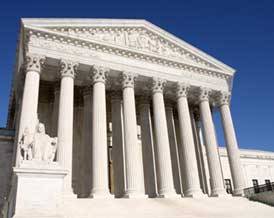
Analysis: Justice Dept. Presses Supreme Court to Resolve DOMA Challenges
Blog Search
Update: Jon Davidson, Legal Director for Lambda Legal, talks to Prop 8 Trial Tracker's Scottie Thomaston about the DOMA challenges and the Supreme Court. Read the interview.
Prop 8 Trial Tracker's Scottie Thomaston analyzes the Justice Department's petitions to the U.S. Supreme Court to review two legal challenges to the so-called Defense of Marriage Act:
In the first challenge, Golinski v. Office of Personnel Management, (brought by Lambda Legal) a district court in California struck down Section 3 of the Act as unconstitutional. The Justice Department then asked the Ninth Circuit Court of Appeals to do one of two things: (1) hear the case initially with an en banc panel (eleven Ninth Circuit judges instead of a three-judge panel), or (2) proceed with a three-judge panel but put the case on an expedited schedule so briefing and argument would be completed faster. The appeals court denied initial en banc review, but granted the request for the expedited schedule and set oral argument for the week of September 10. From there, briefs were filed on both sides, with amicus curiae (“friend of the court”) briefs on behalf of the Bipartisan Legal Advisory Group (BLAG), who is defending the law on behalf of House Republicans due by June 11. Amicus briefs on behalf of the plaintiffs (same-sex couples) are due by July 10.
Then, unexpectedly last night, the Justice Department sent a letter to the Ninth Circuit informing them that it was seeking a writ of certiorari to the Supreme Court, bypassing review of the law by the appeals court. Attached to the letter was the petition for certiorari itself. The most significant thing about this move is that while sometimes the Supreme Court is asked to review a case before an appeals court judgment is entered (called “certiorari before judgment” or “cert before judgment”) it is rarely granted, and only in instances where the issue to be resolved in the case is considered highly important. For example, cert before judgment was granted in US v. Nixon, the case involving the papers and tapes of President Richard Nixon. It was granted as well in Ex parte Quirin, a national security case involving military commissions. Certiorari before judgment was granted as late as 2005, in United States v. Booker. It is seen as a highly unusual move, though arguably a federal law that immediately impacts hundreds of thousands of same-sex couples in several different court circuits could potentially qualify as of national importance. As Jon Davidson, Lambda Legal's national legal director (and one of the counsel for Golinski tells me, “Federal statutory provisions expressly allow any party to a case pending before a court of appeals to ask the Supreme Court to grant review before oral argument or decision by the intermediate appellate court.”
More analysis here.
More on the Golinski case here.
More on DOMA and and interview with Karen Golinski here.
Earlier: "Justice Dept. Asks Supreme Court to Hear DOMA Challenge"




